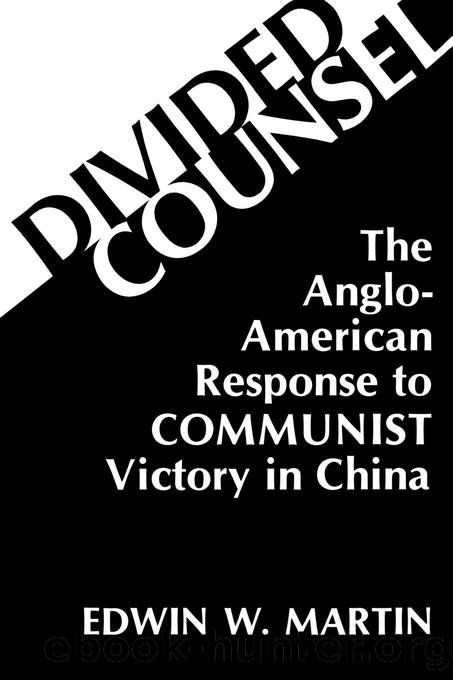Divided Counsel by Martin Edwin W.;

Author:Martin, Edwin W.; [Martin. Edwin W.]
Language: eng
Format: epub
Publisher: University Press of Kentucky
Published: 2021-08-15T00:00:00+00:00
22
An American Probe
In an effort to ensure that the CPG understood the reasons the United States was pulling its officials out of China, and to probe Pekingâs attitude toward the United States, the State Department instructed Consul General Clubb on March 22 to endeavor to arrange an âinformal interview with Chou En-laiâ or with the highest available official, making sure that the Chinese did not construe his request as a preliminary move toward recognition or a sign of U.S. weakness under pressure. Clubb was to point out that the U.S. public could not understand such measures as the Communistsâ refusal to permit the departure of American officials and businessmen from Shanghai, the continued detention of Smith and Bender, the previous detention and ill-treatment of the U.S. consular staff in Mukden, and the seizure of U.S. consular properties in Peiping.â He was to emphasize the importance of such measures in determining the attitude of the U.S. public and government toward the CPG. Clubb was instructed to find out what the views of the Communist authorities were and what their attitude toward the West, particularly the United States, was.1
Some two months earlier, shortly after the seizure of the U.S. consulate building in Peking, Clubb had recommended to the State Department that he be authorized to seek an interview with the Foreign Ministry some time after Maoâs return from Moscow. Clubb wanted authorization to say that the U.S. government assumed and expected that the requisitioned U.S. consular property would be returned at an early date and that âupon such restitution American Government will be prepared turn its attention again to question recognition.â At that time Clubb thought several factorsâincluding the strong U.S. reaction to the property seizure, which, in Clubbâs view, exceeded Chinese expectations; disillusionment with negotiations in Moscow, which Clubb thought probable; and the increasingly desperate economic situation of Chinaâmight persuade the Communists to consider restitution. Underlying Clubbâs request was his conviction that âCommunists desire American recognition for both political and economic reasons.â2 The State Department informed Clubb that it was considering his suggestion that the Communist authorities be approached on the question of restitution of the American consular property but cautioned him against giving any indication that restitution âwould in any way affect question recognition.â3
Clubbâs belief that Mao and Chou might well return from Moscow disillusioned was not dampened by the conclusion of the Sino-Soviet Treaty on February 14. Clubb reported on February 20: âScattered Chinese reaction thus far unfavorable. They view alliance as constituting crystallization situation to their disadvantage. . . . Quite apart from fact loan is pitifully short of Chinaâs needs, is basic fact that poverty-stricken China must repay loan together with interest.â4 Clubb had expected the CCP leaders to be disillusioned with their negotiations in Moscow, and now he was reporting corroboration of a sort for this opinion. Thus it is perhaps not surprising that on February 23 he informed the State Department that he thought the return of the two Communist leaders from Moscow might occasion a feeler from the Chinese side with a view to improvement of Sino-American relations.
Download
This site does not store any files on its server. We only index and link to content provided by other sites. Please contact the content providers to delete copyright contents if any and email us, we'll remove relevant links or contents immediately.
| Anarchism | Communism & Socialism |
| Conservatism & Liberalism | Democracy |
| Fascism | Libertarianism |
| Nationalism | Radicalism |
| Utopian |
The Secret History by Donna Tartt(18081)
The Social Justice Warrior Handbook by Lisa De Pasquale(11940)
Thirteen Reasons Why by Jay Asher(8414)
This Is How You Lose Her by Junot Diaz(6409)
Weapons of Math Destruction by Cathy O'Neil(5798)
Zero to One by Peter Thiel(5458)
Beartown by Fredrik Backman(5303)
The Myth of the Strong Leader by Archie Brown(5215)
The Fire Next Time by James Baldwin(4997)
How Democracies Die by Steven Levitsky & Daniel Ziblatt(4940)
Promise Me, Dad by Joe Biden(4897)
Stone's Rules by Roger Stone(4831)
100 Deadly Skills by Clint Emerson(4660)
Rise and Kill First by Ronen Bergman(4535)
A Higher Loyalty: Truth, Lies, and Leadership by James Comey(4532)
The David Icke Guide to the Global Conspiracy (and how to end it) by David Icke(4359)
Secrecy World by Jake Bernstein(4354)
The Farm by Tom Rob Smith(4303)
The Doomsday Machine by Daniel Ellsberg(4230)
